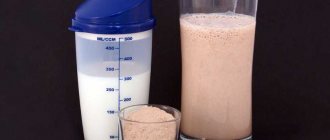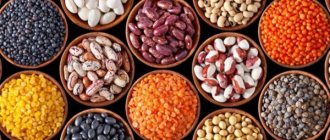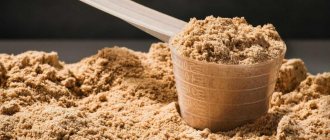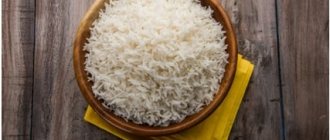- What is protein and why is it needed?
- How to use protein for weight loss?
- Protein for gaining muscle mass
- Types of protein and their differences
- Soy protein
- Whey Protein
- Casein
- Beef protein
- Egg protein
- Vegan protein
- Multi-component protein
People who consciously choose a sports lifestyle and work out in the gym several times a week strive to achieve results faster - to pump up muscles, improve their well-being, and so on. And to achieve success, you need not only to diligently perform the exercises, but also to eat right. Therefore, fitness enthusiasts search store shelves and the Internet for the best protein. And since demand creates supply, in Russia consumers now have a choice of dozens, if not hundreds of manufacturers of protein supplements.
What is protein?
Protein or protein is one of the most important nutrients; it is necessary for high-quality growth and strengthening of muscles. Protein contains a number of amino acids that are actively involved in the synthesis of many tissues inside the human body, including the construction of muscle fibers.
Of course, people who do not engage in sports or strenuous physical labor absolutely do not need to take protein shakes. They get the required amount of protein from their usual daily diet.
People come to sports cocktails with protein if your body receives regular exercise and your goal is to lose weight or gain muscle mass. In this case, eating the usual three meals a day will not help for either goal. And, in order not to stand at the stove for days, athletes take protein shakes.
Scientists began to synthesize protein, calling it classical protein, where the composition of purified protein is ~ 80 percent. The convenience and ease of obtaining essential nutrients for an athlete’s body has created a demand for protein supplements.
Surprisingly, with the help of protein you can not only gain muscle mass, but also, as mentioned earlier, get rid of excess fat deposits. The only thing that is required to achieve maximum results is to clearly define the goal and combine taking the drug with diet and strength training.
Of course, any restrictions in the usual diet negatively affect a person’s psycho-emotional background and lead to stress. By taking protein you get rid of the feeling of hunger and don’t break down.
Let's figure out which type of sports nutrition should be preferred! Before that, let’s study what effect protein has on the body and what the rate of consumption depends on in each specific case. It is quite natural that experienced heavyweight athletes will not be suitable for supplements that are recommended for beginners, teenagers and girls.
Why do you need protein?
It is common knowledge that protein is a nutritional supplement recommended for athletes. By eating regular foods, people “feed” the body not only with proteins, but also with fats and carbohydrates, but for athletes, proteins are the most important component.
It is quite difficult to calculate the dose of protein intake, and in order to get enough of it every day, a person would have to eat dishes prepared using a certain technology 5-6 times a day. It is obvious that such a regime is almost impossible to maintain.
This is where nutritional supplements come to the rescue: the athlete dilutes the mixture with water, drinks it, and the body is immediately supplied with the necessary substances. Thus, protein:
- saves time and money - most of the budget is spent on preparing a variety of food;
- restores the body after endured stress;
- Helps the athlete, on the one hand, with losing weight, and on the other, with building muscle mass;
- harmless - the powder contains only natural ingredients;
- reduces the load on the stomach, because the solution is absorbed more easily than solid food.
Protein mixtures of natural origin
Having trouble choosing the right protein? We will make your task easier and present a list of the highest quality protein mixtures.
Protein
BSN Syntha-6 Isolate
100% whey protein isolate! The highest quality instant release protein blend!
Dymatize ISO-100
Fast-acting hydrolyzed whey protein without lactose, fat or carbohydrates.
Twinlab Whey Fuel
21 g of protein per serving, a protein complex for effective muscle gain.
Optimum Nutrition Gold Standard 100% Whey
Fast-absorbing whey protein. Contains whey protein isolates and easily digestible Hydrowhey whey peptides.
BSN Syntha-6
Universal complex protein, contains 6 different types of protein with different rates of absorption, from slow casein to fast isolate.
Dymatize Elite Whey Protein Isolate
Low-carb whey protein is an ideal choice for those watching their weight!
Gaspari Nutrition MyoFusion Probiotic Series
A complete protein supplement enriched with probiotic cultures to support digestion and strengthen the immune system.
Optimum Nutrition Platinum Hydrowhey
Hydrolyzed whey protein is highly purified and has a fast absorption rate.
Optimum Nutrition Platinum Hydrobuilder
Hydrolyzed whey protein enriched with digestive enzymes, betaine and creatine.
In my opinion, the quality of the protein powder is much more important than the overall protein content.
Carefully study the information on the label when purchasing protein powder (preference should be given to those protein mixtures that contain no more than 7-10 ingredients). In addition, try to choose protein mainly with natural ingredients. If you find it difficult to pronounce the composition of the protein mixture, it is better to leave such a product on the shelf.
Also, when choosing protein powder, you should not take advertising promises at face value that so-called “additional ingredients” can supposedly speed up muscle gain.
Sports nutrition manufacturers resort to all sorts of tricks, adding a negligible amount of some additional ingredient to the protein powder. This substance itself may be useful for accelerating muscle gain. However, taking into account the quantities in which it is presented in the protein mixture, one cannot count on any additional effect. Protein mixtures with a sufficient content of such additional substances cost an order of magnitude higher and are not optimal in terms of price/quality ratio.
How to properly consume protein for weight loss?
Of course, protein is not a fat burner in the traditional sense, so no one has yet lost weight from consuming it. It does not accelerate metabolic processes or destroy fat cells, but saturates muscle tissue with amino acids that promote its rapid recovery and growth. This begs a reasonable question: how does this substance help you lose weight? In order to answer it, it is necessary to delve into the theory.
When anyone loses weight, they lose not only subcutaneous fat, but also muscle mass. In order to not end up becoming a bony degenerator during the process of losing weight and to prevent the destruction of muscle tissue, it is necessary to provide them with a sufficient amount of protein.
Only by ensuring daily protein consumption in the amount of 2 grams per 1 kg of body weight, you can avoid muscle breakdown and stimulate the synthesis of new tissue, instead of wasted by the body for its own needs.
Thus, consuming protein allows you to lose weight without harming the health of the body and makes it possible to avoid loss of muscle mass. All professional bodybuilders recommend following a properly selected diet and regularly performing strength exercises in the gym while taking protein. Over the years of playing sports, our specialists have not met people who managed to lose weight without radically monitoring their diet and systematically performing physical exercises.
In general, summarizing the opinions of experts, it is worth highlighting the following advantages of consuming protein for weight loss:
- Most low-calorie diets for losing extra pounds do not include enough protein. In this regard, the first weight losses are associated with the destruction of muscle tissue, and not with the loss of fat. This is harmful not only for athletes who strive to maintain beautiful and strong muscles, but also for every person. With a critical decrease in the amount of protein in a person’s diet, the risks of many unpleasant diseases increase, since without amino acids the immune system cannot fully function.
- With a lack of protein, the human body shows signs of aging faster. Many deep wrinkles appear, the skin becomes dry and flabby, hair and nails become dull, brittle, and grow slowly. Men may develop erectile dysfunction, and women may experience menstrual irregularities.
- Due to the limited supply of protein to the body, in most cases, negative mental phenomena are observed. This is a constant bad mood, apathy, feelings of mental anxiety, loss of former life priorities. Such phenomena can lead to neuroses or serious mental illnesses such as depression.
- Since the natural mechanisms of fat burning in the body are triggered only with the participation of protein enzymes, this process will not take place if protein foods are excluded from the diet. Even the most exhausting diet will not help cope with fat deposits if the body does not receive enough amino acids.
- When digesting and assimilating protein foods, the body spends much more energy than processing other nutrients. The difference can reach 30 percent or more. What’s noteworthy is that this requires energy through the breakdown of fat deposits.
- By regularly consuming enough protein foods, the body triggers natural mechanisms to optimize blood glucose levels. Due to this, it is possible not only to maintain general health at a high level, but also to get rid of excessive feelings of hunger.
Consumption of increased amounts of minerals and vitamins should also be included in the diet of an athlete who is trying to “lose excess weight.” It is also necessary to count calories and maintain an energy deficit.
As you know, to lose weight it is necessary to provide favorable conditions for burning fat cells. To do this, even taking into account protein intake, you need to consume 15% more calories than the athlete will consume. This is the only way to significantly speed up the burning of fat deposits and achieve weight loss.
Using this principle, you can lose weight while on any diet. Moreover, the age and gender of a person does not matter at all. The only condition is to drink a protein shake daily between meals. There should be at least 2 such unique protein snacks during the day.
In this case, the daily calorie intake will remain unchanged, but the amount of protein consumed will increase several times. This way you can kill two birds with one stone: get rid of excess fat and prevent the destruction of muscle tissue.
Content
- 1 Whey protein
- 2 Casein
- 3 Hydrolyzate
- 4 Isolate
- 5 Soy protein
- 6 Egg white
- 7 Milk isolate
- 8 Protein and protein-carbohydrate window
- 9 Protein shake recipe
Which protein is better?
Protein Manufacturers
Protein Comparison
Protein is the main element in the structure of muscles. Protein is growing in popularity in the bodybuilding world. Among all existing food products, protein contains the largest amount of protein. Protein nutrition allows the athlete to gain the desired muscle mass and achieve the desired results.
Proteins are the main components of the cells of the human body, working to restore, protect and grow tissues. They provide the body with energy balance and help produce up to 20% of energy during exercise.
During intense physical activity on the body, it is necessary to eat foods with a large amount of proteins. Protein contains the maximum amount of amino acids and protein. Impact training contributes to the destruction of muscle tissue, the task of protein is to cope with this destruction and increase muscle volume.
Protein performs a whole range of vital functions for the body, including stimulation of growth, reduction of muscle mass, and maintaining the body in tone. In order to force the body to act and achieve the desired results, you need to know what kind of protein to drink. To begin with, there are seven types of proteins:
- whey;
- casein;
- hydrolyzate;
- whey isolate;
- soy;
- egg;
- milk isolate.
Let's take a closer look at each type and find out what benefits you can get by choosing one or another type.
Whey Protein
Whey protein is the most popular type of protein among athletes. It is a main component in many types of sports nutrition and various supplements. Due to the fact that it contains lactose and proteins, even beginning athletes take it. The undeniable advantage of whey protein is its price. Compared to other types of protein, it is not expensive. You can take it before training to replenish your energy charge during exercise, and after training to renew expended resources.
Casein
Casein is a special type of protein that takes a long time to break down in the human body - about eight hours. Professional trainers and nutritionists advise taking it in the evening. Thus, the body will maintain a state of muscle growth throughout the night, saturating the body with the necessary microelements. A distinctive feature of casein is its anti-catabolism, that is, it prevents the destruction of muscle tissue.
Bodybuilders take casein throughout the day to satisfy hunger and fill the body with protein. The high content of glutamine allows the athlete to improve immunity. Science has proven that athletes who consume casein recover from injuries much faster.
Hydrolyzate
Hydrolyzate is one of the highest quality sources of protein. It has a high price compared to other types. The hydrolyzate contains peptides that stimulate the body to increase anabolic processes. Thus, the hydrolyzate has a positive effect on the human digestive system. It stimulates the body to cleanse itself. This type of protein is suitable for bodybuilders seeking to restore natural strength immediately after training and replenish glycogen stores in the body.
Isolate
Isolate is one of the popular types of quickly digestible proteins. This is protein in its pure form, without unnecessary additives. Its price is relatively high, but its taste and healthy qualities justify everything. This is an excellent solution for athletes on a low-calorie diet.
The isolate is absorbed within half an hour, making it ideal for pre-workout use. If for some reason you didn’t eat at home, were late at work, etc., make your choice in favor of isolate. You can also drink it after a workout, but then it’s better to try to prepare a cocktail with water or skim milk (if your goal is not to gain weight), since a drink with milk will be high in calories. The isolate will charge the body with all the necessary nutrients.
Soy protein
Soy protein is the main source of protein for vegetarians and vegans. It consists of a complex of substances useful for the human body. Its main components are glutamine and arginine. Athletes need protein to gain muscle mass. For one kilogram of body you need to consume 250-350 grams of protein per day. Eight amino acids must be present in its composition. The biggest problem for vegetarians is the lack of amino acids in plant proteins. But this problem can be easily solved by consuming soy protein. Also contains BCAA complexes. They promote rapid recovery of muscle structure and relieve post-workout pain. BCAA supplements with caffeine serve as an additional energy source.
Soy provokes the growth of thyroid hormone, due to which a person’s metabolism accelerates. Thus, fat deposits leave the body. Another benefit of soy protein is its high level of natural minerals and vitamins. Soy protein is drunk before and after workouts.
Egg protein
Egg white is the type of protein that contains the highest level of amino acids. We immediately emphasize that in addition to amino acids, it contains a maximum of carbohydrates, so it is not recommended for people who want to lose excess weight. You can take it at any time of the day.
Milk isolate
Milk isolate is a symbiosis of casein and whey protein. It is characterized by a high content of amino acids. Can be used at any time of the day. For people working to gain muscle mass, it is recommended to take a gainer. It is prepared with both water and milk. After each workout, drink the required portion, and the result will not take long to arrive. In order to lose weight as quickly as possible and not feel muscle pain during exercise, drink L-carnitine complexes. They work for rapid weight loss.
Proteins for gaining muscle mass
As for gaining muscle mass with protein, everything is elementary. The process of building muscle mass mainly occurs during recovery. As a result of training, muscle fibers received stress (microtears, microtraumas). During the rest period, when a person does not train, the process of muscle recovery occurs. At the site of their tear, new fibers are synthesized.
This process occurs when the body has the resources to build new tissue. As we all know, the main resource for building muscles is protein, or scientifically called protein. Protein is the building material for muscles and muscle growth is simply impossible without a sufficient amount of protein. Although here the authors of the article allowed themselves to lie.
If you dig deeper, the protein itself consists of the amino acids BCAA, which in turn consists of the amino acids valine, leucine and isoleucine. Let's take a closer look at the properties of each amino acid:
- Leucine. Promotes a slight decrease in blood sugar levels, while enhancing the production of growth hormone. Helps accelerate the recovery of muscle tissue, skin and bones. Suppresses the breakdown of proteins and glucose. Enhances insulin production. Ensures the maintenance of the necessary water balance in the body.
- Isoleucine. Helps reproduce hemoglobin. Increases the athlete's endurance and restores damaged muscle tissue. Increases stress resistance. Disintegrates in muscle tissue releasing energy. Balances blood sugar levels.
- Valin. Needed to restore muscle tissue and more. Accelerates the healing of microdamages. Positively affects the nitrogen balance of the body.
The body needs them during the recovery period. Not forgetting, of course, about the transport elements that provide energy - carbohydrates, complex in the general diet and fast, for example, a banana, in order to quickly replenish energy reserves right before an increased load. How to take protein to gain muscle mass is written on the packaging of your protein. But on average, protein is taken in the morning, after training, and before bed. Also, if you don't have the opportunity to eat during the day, a protein shake will be a great snack option. But remember, sports supplements should not exceed 40-50% of your total daily diet.
Naturally, the athlete’s body requires increased replenishment of vitamins, minerals, and healthy fats. Only by maintaining the balance of all substances and maintaining a calorie surplus at the proper level will an athlete be able to gain weight. Calorie surplus? An athlete must consume more calories every day than he expends, otherwise where will the energy come from to build muscles?
Several types of protein were mentioned above. It's time to look at all types of protein so that readers can decide on the choice of a sports supplement.
Types of protein and their differences
- Casein protein. Contains all types of amino acids that the human body cannot do without. It perfectly supplies muscle tissue with energy and plastic material, helps preserve muscles during dieting, and resists their destruction. The most important feature of casein for weight loss is that it suppresses appetite better than all other products, and at the same time does not cause any harm to the body. During the period of gaining muscle mass, use casein protein at night so that it nourishes the body most of the night.
- Whey Protein. It has high biological value and is a leader in the content of essential amino acids of the BCAA group. Compared to casein, it is quickly absorbed, metabolic processes are significantly accelerated, the body's energy needs increase, due to which rapid fat burning occurs. An important property is that it is more effective as an anabolic product than other types of protein supplements - it serves as a fast protein to prevent catabolism.
- Soy protein. A natural product of plant origin, which has a mild, delicate effect on the body. It is perfect for those who have allergic reactions to proteins of animal origin, and will also be a real godsend for vegetarians, because their diet cannot contain such valuable natural protein products as fish, meat, and cheese. The sports supplement also has anabolic and fat-burning properties and does an excellent job of improving immunity.
- Beef protein. An expensive type of squirrel. The main feature is the presence of an increased amount of creatine in the composition, which maintains the level of cell division at the desired level. Beef protein differs from whey protein in the absence of lactose and other carbohydrates. High absorption rate and rich composition of amino acids.
- Egg white. The speed of absorption is inferior to casein. However, it has an increased number of amino acids in its composition due to protein of animal origin.
- Vegan protein. A combined, plant-based product consisting of many proteins. They mainly combine pea, soy and rice protein, thereby creating a perfectly balanced product for vegetarian athletes.
- Complex protein. Same meaning as vegan. Sports nutrition brands combine animal proteins to create nutrient-dense products.
Let's move on to a detailed consideration of the types of protein for various tasks. To understand which protein is the best in your particular case.
Types of protein
Whey
This type of protein is obtained from boiled whey, in which, under the influence of high temperature, the milk protein coagulates and is easily separated from the rest of the liquid. It is quickly broken down and absorbed by the body (within about 2 hours) and is an excellent restorative agent after serious physical exertion.
It is also recommended to take it in the morning to stop catabolism - a process when the body, hungry overnight, begins to draw energy reserves from muscle tissue.
Protein, after heat treatment and filtration of whey, can undergo additional purification from fats and carbohydrates or be sent to the shelves “as is.”
Depending on how high the degree of filtration of the finished product is, there are three subtypes of such additives:
1. Concentrate is the most affordable option. It contains about 60-80% protein, the rest being fat and carbohydrates. Concentrated protein is obtained in the first stage of whey filtration.
2. Isolate – does not contain lactose and is absorbed faster than concentrate. In it, protein occupies up to 92-95%, and fat content does not exceed 1%. This degree of purification is achieved by microfiltration or reverse osmosis.
3. Hydrolyzate - here the protein molecules are already broken down into amino acids, which are instantly absorbed by the body and immediately enter the general bloodstream.
Pros:
- Ideal amino acid profile;
- Quickly digested and absorbed into the blood within 20-40 minutes;
- Perfectly restores muscle fibers after intense training;
- Can be used both at the drying stage and when gaining weight;
- Has a pleasant taste;
- Relatively inexpensive.
Minuses:
- Not suitable for people with milk protein intolerance - the only exception is isolate.
Casein
This protein is also obtained from milk, only pre-skimmed (buttermilk). It is absorbed very slowly - from 6 to 8 hours, gradually saturating the body with amino acids. Most often it is taken for weight loss and drying the body, because it satisfies the feeling of hunger for a long time.
Casein can be supplied as a split hydrolysate or micellar protein obtained by ultrafine filtration of milk. The latter is able to “feed” the body with protein for 10-12 hours.
Pros:
- Gives a long-lasting satiety effect and reduces appetite;
- Includes a rich set of amino acids;
- Stimulates protein synthesis in muscles;
- It has a complete amino acid composition and contains a decent dose of calcium;
- Ideal to take before bed, preventing muscle catabolism.
Minuses:
- As with whey protein, it is not suitable for athletes with lactose intolerance;
- The taste is not for everyone.
Egg
The so-called reference protein, which contains neither fats nor carbohydrates, but contains almost all the amino acids the body needs, as well as a whole range of microelements and vitamins.
It is produced from chicken eggs, removing the yolk and all moisture from them. This is a medium-rate protein that begins to break down in the body an hour after consumption and nourishes it for 4 hours.
Pros:
- Almost 100% digestibility;
- Rich in minerals, trace elements and vitamins;
- Does not contain fat;
- Dulls the feeling of hunger;
- Excellent recovery after training.
Minuses:
- Rarely produced in pure form;
- Expensive;
- Causes allergies in people sensitive to egg white.
Meat
Its properties are close to 85% whey isolate, but unlike it, it does not cause problems for people with lactose intolerance. Meat protein is usually obtained from beef and must be purified, removing cholesterol and fats.
Pros:
- Suitable for those who cannot tolerate milk protein or gluten;
- Has a balanced composition of amino acids;
- Contains its own creatine;
- Quickly and almost completely absorbed by the body.
Minuses:
- It's not cheap;
- Has a bitter taste.
Vegetable
Plant protein is most often obtained from soybeans, but it can also be obtained from rice, peas, hemp or wheat. This is an acceptable option for vegetarians, although the amino acid profile is very far from ideal. To improve the quality of plant protein, leucine is added, which actually makes muscles grow.
Pros:
- Does not contain substances of animal origin;
- Has an average absorption rate;
- One of the cheapest protein options.
Minuses:
- Incomplete digestibility;
- Poor composition of amino acids;
- Frequent use and large doses provoke flatulence.
Vegetarians should take a closer look at hemp proteins. Their composition is richer than that of soy extract, which allows them to somehow compensate for the lack of animal proteins in the diet.
Soy protein
For those athletes looking for affordable natural nutritional supplements, it is worth paying attention to the composition of soy protein. It does not contain any animal products, so it is perfect for vegetarians who want to achieve maximum results from their sports training.
If earlier soy sports supplements contained harmful components that worsened digestion and negatively affected the absorption of nutrients in the gastrointestinal tract, now proteins are produced purified, with a high concentration of valuable amino acids. The biological value of soy protein composition has an average value of 74.
Main components and characteristics of soy protein
The amino acid composition of soy protein is characterized by the following features:
- Low methionine content. Manufacturers compensate for the lack of this amino acid in the soy protein complex by adding it to the supplement, due to which excellent muscle growth, immune strengthening, and antioxidant properties are observed when consuming soy protein.
- Low BCAA levels. It is worth noting that, despite the increased attention to the essential amino acids of this group, the human body cannot absorb them in unlimited quantities. Therefore, to increase muscle volume during training and prevent catabolism, in most cases, the amino acids contained in soy protein and food are sufficient.
- Antinutrients. The substances have the properties of disrupting optimal protein digestion and stopping the absorption of nutrients. If the amount of them in soy itself is quite large, then in the composition of the additive developed by professionals there are either none of them at all, or there is a tiny amount that does not have a negative effect on the body. Before protein is extracted from soy, it is thoroughly purified to remove protease inhibitors and lectins.
- A large number of phytoesterogens. The doses of soy protein recommended for use as a sports supplement contain the optimal amount of isoflavones. A decrease in testosterone levels and an increase in the amount of female hormones, which athletes are afraid of, is not observed, since isoflavones are similar to esterogens, but do not function in the same way. The effect of phytoesterogens on the athlete’s body is very beneficial - it prevents gynecomastia, cardiovascular diseases, cancer, prostatitis, and has an anti-inflammatory effect.
- A large amount of glutamine in the composition. In terms of the content of this amino acid, soy protein is superior to sports supplements of animal origin. The amino acid serves as the main component for building muscle, so when taking this supplement, positive results are observed - muscle volume increases, they become stronger. The substance also does an excellent job of anti-catabolic function, helps quickly recover after workouts and improves immunity.
- Contains an increased amount of lysine. Serves as a powerful tool for strengthening the immune system, supports the health of the heart and blood vessels, and accelerates tissue regeneration. In addition, lysine has excellent energy properties, so after long workouts it helps to feel a great surge of strength, which is important for good health.
- Does not contain lactose. This is a huge advantage that makes soy protein different from casein and whey protein. Thanks to this, it is well absorbed, making it suitable for athletes who cannot tolerate dairy products.
Pros and cons of soy protein
The only product from which soy protein is made is natural, environmentally friendly soybeans. During the production of a sports supplement, raw materials undergo multi-stage processing. It includes separating water from the plant, turning it into powder form, separating harmful antinutrients, fats, carbohydrates, squeezing concentrated protein, enriching the composition with methionine, flavorings and additives, and safe preservatives.
A complex technological process allows us to produce a high-quality and safe food additive, which will be characterized by the following objective advantages:
- Easy to digest.
- Pleasant taste and aroma.
- Effective effect on the growth of muscle mass and strength;
- Strengthening the immune system.
- Improved metabolism.
- Optimization of the general condition of the body.
- Positive effect on the recovery of the body after training.
- No side effects.
- Improving thyroid function.
The downside will be the incomplete BCAA chain in the structure of soy protein.
The benefit of soy protein supplements is that they contain a small amount of fiber. Thanks to this compositional feature, the product perfectly suppresses appetite, improves digestion, and also serves as an excellent natural absorbent.
Athletes who prefer soy protein burn subcutaneous fat faster, reduce the risk of gallstones, develop cancer less often, almost never have constipation, and have well-functioning intestinal motility.
Whey Protein
Whey protein is characterized by high manufacturing standards and contains the entire complex of amino acids essential for the human body. The protein norm is an individual indicator; most often it varies depending on age, weight category, gender, degree of activity during the day and other factors.
Whey protein is a valuable source of basic amino acids BCAA, which are classified as essential. During active exercise and strength training, it is extremely important for our body to receive large amounts of these amino acids. Low levels of BCAAs in the body lead to signs of fatigue, decreased activity and slower metabolic processes.
Whey protein is suitable for the following categories:
- people following a special low-carbohydrate diet (whey protein contains a minimum of cholesterol);
- women during pregnancy and lactation;
- vegetarians who consume milk;
- persons with lactose allergies;
- people with gluten allergies;
- persons with digestive problems (whey protein is absorbed by the body as quickly and easily as possible).
There are 2 types of whey protein in sports nutrition:
- Whey protein concentrate, which contains up to 80% protein (depending on product and brand). It has a reduced amount of carbohydrates.
- Whey protein isolate. The most purified protein, more than 90% protein in the composition. The low level of carbohydrates and fats puts this protein in a worthy position in the choice of sports nutrition. For this reason, it is considered one of the most expensive products.
Which to choose
Let's look at the main types of protein in modern fitness culture. To do this, we recommend that you familiarize yourself with the table. Using it, you can quickly identify the protein groups that are specifically needed for you and learn how this or that type of raw protein works.
| Type of protein mixture | What is |
| Casein | Long-acting protein that nourishes the body throughout the day. Has an incomplete amino acid profile. |
| Milk protein | For those who easily tolerate lactose. Low quality raw materials, incomplete amino acid profile. |
| Soy isolate | It lacks the disadvantages of soy - it is cheap, but has an incomplete amino acid profile. |
| Complex egg | It has a complete amino acid composition, but is very difficult to digest. |
| Waterproofing | The cheapest protein used in classical nutrition as an additive to low-quality dairy products. Incomplete amino acid profile. |
| Multicomponent mixtures | Allows you to combine different cheap raw proteins to create the perfect complete protein. |
In fact, there are a huge number of hybrids and other protein sources on the market. Recently, mushroom protein, which is sold exclusively in the USA, has become increasingly popular.
There are also various raw proteins that are not called “protein,” for example, brewer’s yeast, which was actively used by bodybuilders at the dawn of the golden era. However, it will not be easy for the average fitness center visitor to purchase them. In addition, there are a huge number of factors that interfere with the complete absorption of protein from these raw materials.
Read more about whey protein
Protein profile:
- Source: dried whey.
- Amino acid profile: Major essential amino acids present.
- Main task: closing the protein window after training.
- Absorption rate: extremely high.
- Cost: relatively low.
- The load on the gastrointestinal tract: relatively low.
- Efficiency: one of the best.
Whey protein is a bodybuilding classic. Its extreme suction speed has made it multi-purpose. It allows you to close catabolic processes and stimulate anabolic processes almost immediately after the end of training. But the most important thing is its cost. This is one of the cheapest sources of quality protein.
© thaiprayboy — stock.adobe.com
More about casein
Protein profile:
- Source: hydrolyzed protein from curd mass.
- Amino acid profile: Major essential amino acids present.
- Main task: complex nutrition of prolonged action with basic essential amino acids.
- Absorption rate: extremely low.
- Cost: one of the most expensive types of proteins for weight gain.
- Load on the gastrointestinal tract: it puts quite a lot of stress on the gastrointestinal tract. Constipation and other digestive system dysfunctions are possible.
- Efficiency: if used incorrectly, zero. When used correctly, it completely stops catabolic processes when combined with other sports nutrition products.
Like whey protein, it is considered one of the classic methods of maintaining constant synthesis of new muscle protein. Due to its characteristics, it is taken mainly at night, when the digestive system is not able to work to its fullest - casein gradually dissolves and nourishes everything throughout the night.
Must-have milk
Protein profile:
- Source: dairy raw materials
- Amino acid profile: Major essential amino acids present.
- Main task: closing the protein window after training.
- Absorption rate: extremely low.
- Cost: relatively low.
- Load on the gastrointestinal tract: high. Constipation and other dysfunctions of the digestive system are possible.
- Efficiency: quite low.
A cheaper version of whey protein. It is not widely used due to the greater load on the gastrointestinal tract and the presence of lactose, which limits protein intake to 60 g per day. Has a wider amino acid profile.
Soy isolate
Protein profile:
- Source: complex hydrolyzed soybean substrate.
- Amino acid profile: incomplete. Requires additional nutrition from the main food.
- Main task: nutrition of amino acids to athletes who do not consume meat and dairy products. Generation of phytoestrogens for women, allowing to avoid problems associated with changes in the hormonal cycle.
- Absorption rate: extremely low.
- Cost: relatively low.
- The load on the gastrointestinal tract: serious. Constipation and other digestive system dysfunctions are possible.
- Efficiency: quite low.
First attempts to create the perfect plant protein. If purchased correctly, it will cost tens of times less than whey protein. Unlike classic soy protein, soy isolate is almost completely devoid of phytoestrogens, but its value for strength athletes is still a big question.
Complex egg
Protein profile:
- Source: powdered eggs.
- Amino acid profile: complete amino acid profile. All necessary and essential amino acids for the growth of an athlete are present.
- Main task: complex nutrition of prolonged action with basic essential amino acids.
- Absorption rate: extremely low.
- Cost: one of the most expensive proteins.
- Load on the gastrointestinal tract: high. Possible constipation and other digestive system dysfunctions
- Efficiency: highest.
Almost perfect protein created from egg powder. Contains all the amino acids necessary for growth. The only drawback is the side effect of constipation, which is practically inevitable with constant use.
Hydrolyzate - much cheaper
Protein profile:
- Source: unknown.
- Amino acid profile: incomplete. Requires additional nutrition from the main food.
- Main task: nutrition of amino acids to athletes who do not consume meat and dairy products. Generation of phytoestrogens for women to avoid problems associated with changes in the hormonal cycle.
- Absorption rate: varies depending on the quality of the original raw material
- Cost: relatively low.
- Load on the gastrointestinal tract: high. Constipation and other digestive system dysfunctions are likely.
- Efficiency: quite low.
Protein hydrolyzate was a popular, advertised product several years ago. At this time it was one of the most expensive sources of protein. However, it later became clear that due to the complete hydration of the protein, it is impossible to determine its original raw material, while some amino acids, under the influence of such hydration, lost their original parts, which almost completely neutralized their value for the athlete.
Multicomponent protein
Protein profile:
- Source: Varies depending on input components.
- Amino acid profile: Major essential amino acids present.
- Main task: closing the protein window after training
- Absorption rate: varies depending on incoming components.
- Cost: Varies depending on included components.
- Load on the gastrointestinal tract: depends on the composition.
- Efficiency: depends on the included components.
Usually this is a complex substrate, which should include the advantages of each of the proteins, while eliminating the disadvantages. It is worth buying only from trusted manufacturers.
Casein protein
Casein protein is the longest-absorbing protein drink in the body. Ideal for gaining muscle mass (taken at night) and suppressing appetite during weight loss, casein will fuel your body for a long time. After taking it for six to eight hours, building materials will gradually enter the body.
Features of consuming casein protein
In the daily diet of any athlete, the main component of any meal is the anti-catabolic effect. That is, when losing weight, we try to preserve muscles and relief as much as possible. At the same time, focusing on the fat layer. And when gaining muscle mass, gain the maximum amount of necessary elements that will help increase the level of muscle, and not unnecessary fat. Therefore, taking casein for weight loss and weight gain will be different.
- Regardless of your goals, casein protein is not recommended to be taken before or after a workout. Since during these windows the body initially needs a sufficient amount of energy and resources to perform physical exercises and to quickly saturate after using them up.
- Casein protein for weight loss is recommended to be taken two to four times, 20-30 grams between meals and immediately before bed.
- To gain muscle mass, protein is also consumed at night. During the day, for this purpose, use other types of protein and sports supplements, for example, the same gainer.
Types of protein, features, differences and “what you need to know” about each type
Basic criteria for choosing protein supplements:
- effectiveness – the potential ability to help an athlete achieve his goal (increase muscle volume or lose weight);
- speed of absorption and duration of effect;
- load on the gastrointestinal tract - depending on the individual characteristics of the body, one or another type of protein can negatively affect the functioning of the digestive system.
It is information about the characteristics of protein types and their differences that will help you make the right choice.
Whey
The most popular variety. Made from whey by filtering non-protein components. Protein activates metabolism, saturates the body with essential amino acids and inhibits the formation of fat reserves. Whey supplements are called fast. They are absorbed very well and quickly, so they are great for use both before and after training.
The species is divided into subspecies, depending on protein concentration:
- concentrate - a weakly purified subgroup, the share of protein in which is 30-90%;
- isolate – a more filtered version, protein concentration reaches 90-95%;
- hydrolyzate is the purest (up to 99% protein) and quickly digestible whey subtype.
“Whey” contains almost the entire amino acid complex and is characterized by a neutral taste.
Important! Each type can be manufactured with varying degrees of purification.
Casein
It is a slow protein and is absorbed worse than the previous version. But due to this, it becomes possible to extend the protein effect. Casein is not recommended for post-workout use. Its main function is to ensure that muscles are saturated with the substances necessary for their growth during sleep.
Casein protein is also made from milk (from curd mass). The species is rich in calcium, does not have a particularly pleasant taste and is relatively poorly soluble. The protein effect lasts about 5-10 hours. Casein can put quite a lot of stress on the gastrointestinal tract. The slow subtype is appropriate to combine with fast options. But without taking into account its features, consuming casein is almost pointless.
Lactic
A less expensive and effective option for whey supplements. Combines the features of fast and slow proteins. It consists of 80% casein and 20% whey. Despite being much less popular than the first, classic type, it is well suited both for consumption between meals and as a metabolic boost during protein “downtime” (during sleep, flights, etc.). The validity period of the additive is 3-4 hours.
However, many people believe that it is better to specialize to solve specific problems. It is not recommended to take the milk version before or after physical activity. Since milk protein contains lactose, it is suitable only for those who are not limited in its consumption by digestive features.
Soy
Protein based on plant components. Due to this, the amino acid composition of soy protein is incomplete, and the biological value is the lowest among all types. Since we are talking about disadvantages, let’s add a few more disadvantages to the list: the additive does not dissolve well in water, does not have a pleasant taste, and can cause constipation.
But soy protein is a godsend for vegetarians and those who suffer from lactose intolerance. This type is best suited for women - soy has a positive effect on the production of female sex hormones. Among other things, the supplement reduces cholesterol levels in the body. Soy protein works within 3-5 hours. It can be consumed between meals and after training.
Egg
Nothing is ideal, but this look, like no other, is close to ideal. Contains almost the entire necessary amino acid series - the value of the supplement, which is produced from egg powder, is the highest. This option has only two drawbacks - high cost and possible side effects in the form of constipation or other gastrointestinal problems (if taken regularly). This is the only reason why it is inferior in popularity to whey protein. Lasts about 3-5 hours. Good for use in the morning, before and after training. Recommended, including for those who suffer from dairy intolerance.
Hydrolyzate
A few years ago, this type of protein was popular and expensive. But due to the inability to identify the protein source, its value in the eyes of consumers has decreased significantly. This was also facilitated by the fact that a number of amino acids lose their original components during the production process. The hydrolyzate is not highly effective, but it does a good job of loading the digestive system. The rate of absorption depends on the protein source.
Who can recommend this type of supplement? First of all, for women who seek to prevent changes in hormonal levels. Potential consumers also include those who are not suitable for proteins based on animal components and milk.
Multi-component protein
Protein complexes are a combination of various subtypes of protein supplements. Composition, price and effectiveness vary. Typically the composition includes the main essential amino acids. The purpose of the view is to smooth out the roughness of other options. How well a particular multicomponent additive does this depends on the raw materials and the manufacturer.
A complete protein is best thought of as a protein that complements casein and whey. Since it contains both fast and slow components, this sports nutrition can be used to close the protein window, between meals, and at night. At the same time, there is no need to talk about very high biological value. If it is possible to carefully select and use specialized supplements, it is advisable to abandon the complexes or reduce their intake to a minimum. In addition, you need to be careful when choosing a manufacturer. The average duration of the effect of complex protein is 3-6 hours.
We recommend that you familiarize yourself with the comparative table of protein types.
| Type of squirrel | Origin | BCAA content (valine, isoleucine, leucine), % | Absorption rate | Taste | Price |
| Whey | Animal | 17 | High | Neutral | Average |
| Casein | Animal | 15 | Low | Neutral | High |
| Lactic | Animal | 16 | And quickly, slowly | Neutral | Average |
| Egg | Animal | 17 | Above average | Specific | High |
| Soy | Vegetable | 10 | Average | Neutral | Low |
Beef protein
As stated earlier. The main feature of beef protein is the presence of creatine in its composition. Meat protein has increased biological value: all components of the drink are absorbed in thirty minutes. To summarize all the information, beef protein shake:
- Increases the time during which nitrogen remains in positive amounts in muscle tissue;
- Accelerates the recovery of muscle fibers;
- Prevents catabolism;
- Does not contain lactose;
- It has its own unique taste.
Of the minuses of beef protein, two points stand out. This is the cost of the product; this type of protein is somewhat more expensive than its species counterparts. Foams when stirred in a shaker. The athlete will have to wait a couple of minutes until the foam settles.
Egg protein
Egg protein is not as popular as other types of sports drink, and manufacturers are not expanding their lines with this protein. Let's figure out why.
Egg protein is obtained from chicken eggs, egg albumin. When making such a drink, a significant amount of amino acids is lost due to elevated temperatures. Elevated temperatures during production are necessary, since the product, as everyone knows, in its raw form is dangerous. And the danger has a name - salmonellosis. Due to this, the protein structure is partially destroyed.
Why do people buy egg white? Everything is easily explained - the rate of absorption of such a protein is comparable to casein protein. And also, due to its animal origin, egg protein has a rich composition of amino acids, which outshines other types of protein. However, the specific taste is not suitable for every athlete.
The best protein for weight loss
If the goal of taking sports nutrition is to burn fat, for example, during the drying period or at the beginning of training, the best option for the athlete is whey protein. At the same time, the supplement should contain a minimum amount of carbohydrates and a maximum of protein, and it is important to combine its intake with strength training. At first, the weight will go up slightly, this is normal for the initial stage of taking the supplement, then everything will return to normal.
The main principles by which you need to choose protein for weight loss:
- fast-digesting protein is preferable to “slow” protein;
- It is better to give preference to whey or egg protein;
- Experts are inclined to believe that for weight loss it is better to choose a complex protein product.
Vegan protein
Vegan or plant-based protein is an ideal option for those athletes who have given up eating meat and animal products in their diet. Sports protein drinks in this category typically consist of:
- Soy;
- Peas;
- Rice;
- Hemp seeds;
- Pumpkin seeds;
- Sunflower seeds;
- Chia Seeds;
- Semyan Inka-Ichi
Manufacturers combine various sources of protein in the composition, resulting in a complex plant-based drink that will not be inferior to animal protein. Moreover, if we take into account modern Swiss and German studies, which have proven the equivalence of animal and vegetable protein.
Egg white
Eggs are an excellent source of high-quality protein.
Of all foods, eggs have the highest absorption rate of their constituent amino acids.
Eggs are also one of the best foods to reduce appetite and help you feel full for a long time.
Egg white may be a good alternative for people with milk protein allergies.
Protein powder is made exclusively from egg whites without the presence of yolks. As with all animal products, egg whites are complete. This means that it provides all the essential amino acids that the body does not produce on its own.
Moreover, egg white is second only to whey protein in leucine content - BCAA, which plays the largest role in muscle development.
Multi-component protein
Multi-ingredient protein is one of the favorite protein drinks. That's because it, like vegan, consists of several types of protein. Vitamins and amino acids, food enzymes and sports supplements such as arginine, creatine, L-carnitine, beta-alanine and others are often added to such drinks.
Basically, sports nutrition manufacturers combine whey, casein and egg proteins. Due to the different speed of absorption, the body receives protein for a long time (up to 8 hours), but due to the whey protein in the composition, saturation with nutrients starts in 15-20 minutes.
Multicomponent (complex) protein
Complex or, as it is also called, multicomponent protein is a good type of protein because it is universal in the time of protein intake, unlike other types of protein, it can be consumed in the morning, before, after training, during the day and at night. Complex protein is a mixture of different types of protein, such as whey protein (concentrate, isolate, hydrolysate), casein protein, egg protein, etc. All multicomponent proteins have a different composition, so you must always look at its composition and what it is. Always look at the ingredients, especially if you are allergic to any type of protein.
Complete Protein Benefit:
- Price
- Ideal as additional sports nutrition, well suited in combination with casein and whey protein
- Suitable for use at any time
Disadvantages of complete protein:
- Has low biological value
- Operating time 3-8 hours











